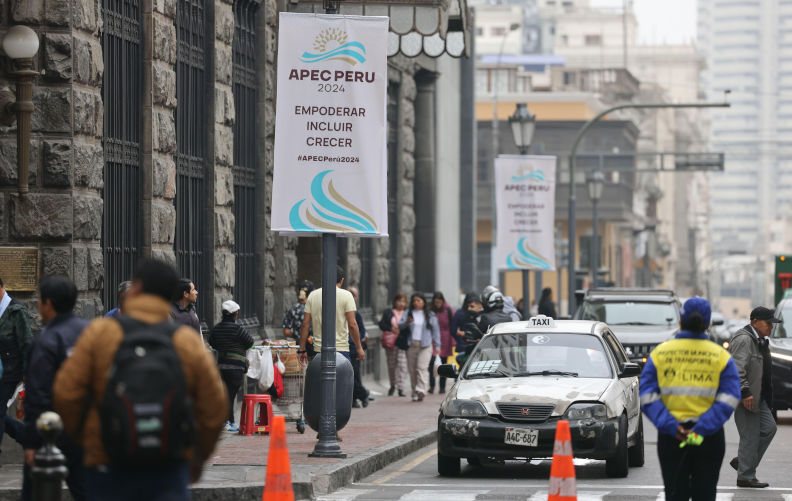APEC – Disintegration or defiance?
November 16, 2024
The APEC Peru agenda has been hijacked by the spectre of a Trumpian attack on its foundational principles. China provides the only viable counterbalance.
APEC Peru is a unique opportunity to prepare for the global trade disruption that commences on January 20 when Donald Trump formally becomes the 47th President of the United States.
The theme of the Peru meeting Empower, Include, Grow is now even more relevant because Trump has made it clear that he will continue to dismantle the institutions of global citizenship, starting with the UN and continuing with the planned destruction or disruption of the world trade organisation and other trade groupings like APEC.
The APEC meeting is the first international trade meeting to take place in advance of the change in the US presidency. The Peru meeting will need to consider the role that APEC will play in the disrupted world of Trump. Will APEC support the dismantling of the WTO, or oppose it? Or will APEC members investigate alternatives to the diminished authority of the WTO.
President Xi Jinping’s participation shows China’s commitment to the APEC platform and regional cooperation. China’s regional leadership is enhanced through cooperative initiatives in trade, technology, infrastructure, and environmental sustainability.
The recent BRICS meeting, and the Shanghai Cooperation Organisation forums, provided a glimpse of an alternative path for trade stability. The mesh of organisations is building a solidarity that challenges the disintegration of previous global structures.
Just how APEC chooses to recognise and fit into this newly emerging mesh, or not, is a crucial question for the future of APEC. It may not be an issue that is formally on the table at the Peru meeting, but it’s a challenge that lurks behind every decision considered in Peru.
The idea that Prime Minister Albanese that Australia as a middle power can provide a bridge between China and the United States is out of touch. Australia is viewed as a spokesman for the United States rather than as an independent player.
The United States has always been a belligerent player in global trade, reluctant to abide by rules set by consensus and ever willing to rely on its own interpretations of rules and how they must be applied. Starting under the first Trump Presidency, continued under Biden, and likely to be ramped up further under the new Trump Presidency, the application of US versions of global rules will become a major hurdle to fair and equitable treatment of trade. These are the core issues which lie at the heart of APEC discussions and aspirations.
Previously as President, Trump was the first to widely (mis)use the ‘security’ escape clause in WTO agreements when it came to unilaterally imposing sanctions and limitations on free trade. US Trade Representative Robert Lighthizer was a champion of this approach and reports say he will be reappointed in the new Trump administration.
Biden followed the same protectionist course with the infamous CHIPS acts and other legislative measures. Trump has already promised to supercharge these questionably legal trade impediments, with massive new tariffs. Given his past performance, there is no reason to doubt his commitment to destroying, blocking and undermining any agreement, collaboration or cooperation that, in his eyes, disadvantages the US.
APEC has the opportunity to step up to the plate by supporting the foundational framework of free trade in the region against the attempts to further destroy free trade. China continues to lead with support for APEC’s collaborative ethos to reduces trade barriers.
It’s questionable if there is such a thing as an antidote to Trump but that does not mean that the US should be permitted to destroy much that is useful for the common good that has come from APEC. Unless the APEC Peru forum recognises and acknowledges these challenges, then the danger is that APEC will discuss its way into irrelevancy.
Trump challenges the APEC aspiration of empowerment by weaponising trade with APEC members through preferential treatment or punishment.
This is not a storm that can be stopped, nor easily avoided. But like any storm, those in its path can take protective measures to limit the damage, to hunker down and survive to emerge in the aftermath shaken, but not defeated .
Survival of the concepts underpinning APEC is paramount. China’s support for the principles of trade and investment liberalisation and facilitation, reduced costs of cross-border trade to assist businesses and economic and technical cooperation stand in contrast to Trump’s beliefs. It is only through concerted and cooperative action that these principles can be preserved, protected, and buttressed to withstand the impact of those forces working to undermine them.
A network is stronger than any individual strand. By bringing together APEC members, the organisation has created a history of laudable achievements. Important as APEC is, it becomes stronger when it is enmeshed in a wider network of agreements and cooperation understandings. APEC members are already also members of BRICs, SCO, ASEAN, RCEP and other trade agreements.
If APEC is able to unite participation in these agreements and find the common threads, then the network becomes stronger and a more formidable barrier against the onslaught of US self interest.
This common cooperation, not forced, not directed, but voluntarily acting in each member’s self interest, and with an eye to the common good, is the concept that underpins the vision of the Global Development Initiative.
APEC Peru gains strength and relevance when it recognises that cooperation is the antidote to coercion.
